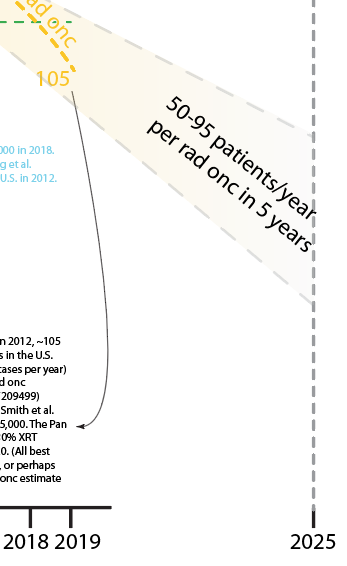- Joined
- Oct 4, 2017
- Messages
- 5,016
- Reaction score
- 9,782
What if all residencies were totally shut down, (obviously wouldn’t happen)but allowed current residents to graduate? How many radoncs would there be in early 2030s -when baby boomers (and all their cancers) have died. No residents for an entire decade!
A: job market still would be vastly oversupplied with far more than 3500 radoncs despite universal hypofract- given presently such a disproportionate number of radoncs near start of their career. Just trying to frame magnitude of the problem.
A: job market still would be vastly oversupplied with far more than 3500 radoncs despite universal hypofract- given presently such a disproportionate number of radoncs near start of their career. Just trying to frame magnitude of the problem.
Rad onc: one of the smallest fields in medicine. Which means it is highly sensitive to what would be more drawn out and less tumultuous perturbative effects within the specialty, vis-à-vis supply/demand, versus that of other fields. Things began looking a little over-supplied around 2010-13. So really we have just had ~7 cycles of new rad onc residency cohorts, and new rad onc grads, in that time frame. There were ~3500 rad oncs nationally in 2010 and there are ~5000-5200 now; this growth has not been offset by rising cancer incidence/prevalence, or increase in new rad onc indications. If anything, the opposite on both counts. And, resident numbers exploded (relative to previous class sizes and the number of rad oncs in America) in that period. Also, practice patterns in rad onc substantially changed (patient treatment schedules have substantially shortened). What HAS NOT been fully "baked into the market" yet is: 1) patient treatment schedules have not maximally shortened yet and their national adoption has been weak (NB: even at academic centers)... once fully adopted this will hurt the workforce market more, 2) trend toward decreased "supervision" (historically a rad onc had to mindlessly "babysit" machines with no active oversight/effort by the MD for the treatment... regulators are beginning to see this as needless), 3) reimbursement pressures which will take the form of one lump sum payment for a diagnosis somewhat irrespective of complexity/length of treatment/mode of irradiation.
An interesting book could be written about it all IMHO.
Last edited:




